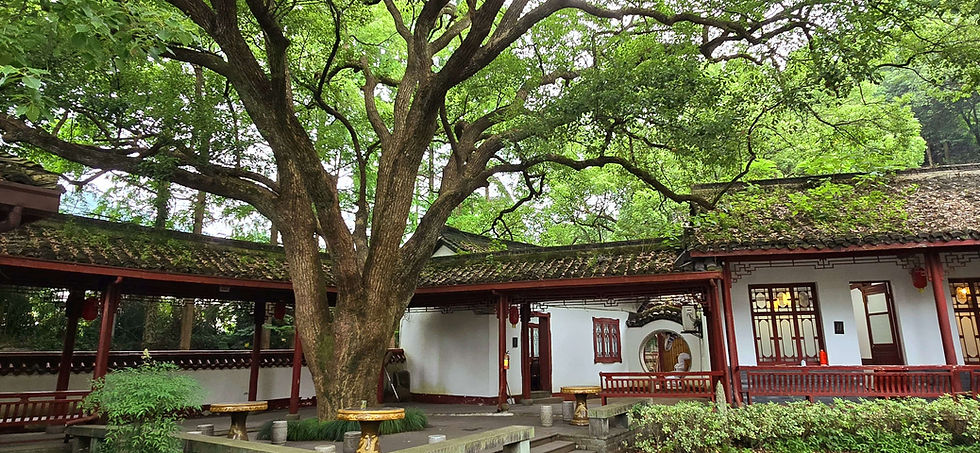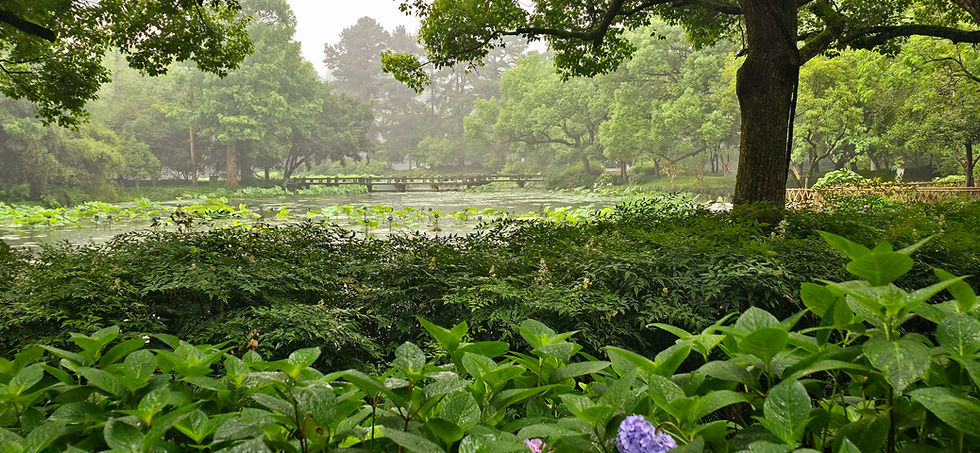Meijiawu Tea Village - Tea of the Emperors
- Shannon
- Jul 19, 2025
- 3 min read
Updated: Jul 25, 2025
The Soul of China’s Ancient Tea Culture
Tucked into the misty hills near Hangzhou’s famous West Lake, Meijiawu is more than just a tea village, it’s a living testament to China’s centuries old relationship with tea. The name "Meijiawu" translates to "The Village of the Mei Family," pointing to a 600-year lineage of hand cultivating tea that began with the Mei clan and continues to thrive today. Over time, this small village grew into a national symbol, with its identity and prosperity deeply intertwined with tea cultivation.

Covering more than 800,000 square metres, Meijiawu Tea Plantation is the largest of its kind in the world. The area's ideal climate and mineral rich soil create perfect growing conditions for Longjing tea, also known as Dragonwell tea. This pan roasted green tea is prized for its flat, jade coloured leaves and smooth, slightly nutty flavor. Revered as one of China’s top tier teas, the finest imperial grade Longjing from Meijiawu can cost as much as $2700 AUD per kilo, placing it among the most exclusive teas in the world.

Meijiawu's importance goes far beyond the commercial value of its crops. Tea has held spiritual and philosophical weight in Chinese culture for thousands of years. In ancient times, it was believed to possess healing properties, capable of cleansing the body, calming the mind and restoring inner balance. Chinese tea ceremonies were not merely social rituals but deeply reflective acts meant to foster a connection with nature and encourage mindfulness. Meijiawu remains a centre of this tradition, with over 160 tea houses still operating in the village today.
The village’s status was solidified around the 1700's during the Qing Dynasty, when Emperor Qianlong toured the region and sampled the local brew. So impressed was he by its taste that he proclaimed Meijiawu’s tea the finest in the Empire. His imperial endorsement catapulted the plantation into national fame, securing its place as a pillar of China’s tea heritage. Generations later, the tea fields he walked among continue to produce what is regarded as one of the country's most culturally significant exports.

Tea's influence on Chinese society goes well beyond the cup. From the Tang to the Song dynasties, poets, painters and philosophers drew inspiration from tea culture. Meijiawu, with its terraced fields and quiet scenery, became a muse in its own right as a symbol of the Daoist ideal of harmony between humans and nature. In this village, the act of growing and brewing tea is not just agricultural, it is artistic, spiritual and enduring.

🗺️ Location
1 Meiling South Road, Xihu District, Hangzhou City, Zhejiang Province, China
🚆 How to get there
Meijiawu tea village is about 20 minutes drive from Hangzhou, so getting a Didi is probably the easiest way to get there, however there are public buses available. From Hangzhou bus station, jump on bus number 12 or 180 or take the West Lake Shuttle Bus Line 3 to Meijiawu.
⭐ Attraction Info
Entry to Meijiawu Tea Village is free and it's open every day of the year. That said, “free” usually comes with a small catch, visitors are invited to sit through a brief information session and tea tasting, which often includes a sales pitch for the local Longjing tea. It’s not overly pushy and some might enjoy learning about traditional tea making techniques from the source. Personally, I wouldn’t go out of my way just to visit Meijiawu but if you’re already planning a day around West Lake, it’s an easy and scenic detour. Most tours will include a visit here. The surrounding hills, tidy tea rows and quiet village paths do offer a peaceful contrast to the bustle of Hangzhou city.
梅家坞茶园

Thanks for reading about Meijiawu Tea Village - Tea of the Emperors. Check out more awesome destinations here!

Meijiawu Tea Village produces Longjing tea, known as the "Tea of the Emperors" for its royal heritage and flavour



















